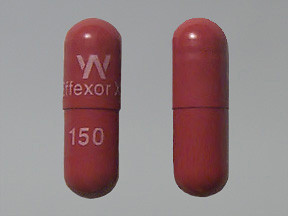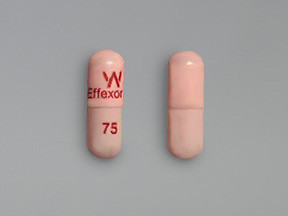VENLAFAXINE SUSTAINED-RELEASE - ORAL
PHONETIC PRONUNCIATION: (ven-luh-FAX-een)
COMMON BRAND NAME(S): Effexor XR
GENERIC NAME(S): venlafaxine HCl
Uses
USES: Venlafaxine is used to treat depression, anxiety, panic attacks, and social anxiety disorder (social phobia). It may improve your mood and energy level and may help restore your interest in daily living. It may also decrease fear, anxiety, unwanted thoughts, and the number of panic attacks. Venlafaxine is known as a serotonin-norepinephrine reuptake inhibitor (SNRI). It works by helping to restore the balance of certain natural substances (serotonin and norepinephrine) in the brain.
How to use VENLAFAXINE SUSTAINED-RELEASE - ORAL
HOW TO USE: Read the Medication Guide and, if available, the Patient Information Leaflet provided by your pharmacist before you start using venlafaxine and each time you get a refill. If you have any questions, ask your doctor or pharmacist. Take this medication by mouth as directed by your doctor, usually once daily with food, either in the morning or evening. Do not crush, chew, or dissolve this medication. Doing so can release all of the drug at once, increasing the risk of side effects. Also, do not split the tablets unless they have a score line and your doctor or pharmacist tells you to do so. Swallow the whole or split tablet without crushing or chewing. If you are taking the capsules, swallow them whole. If you have trouble swallowing the capsules whole, you may open the capsule and sprinkle the contents onto a spoonful of applesauce. Swallow all of the mixture right away without chewing. Drink a glass of water after each dose. The dosage is based on your medical condition and response to treatment. To reduce your risk of side effects, your doctor may direct you to start this medication at a low dose and gradually increase your dose. Follow your doctor's instructions carefully. Take this medication regularly to get the most benefit from it. To help you remember, take it at the same time each day. It is important to continue taking this medication as prescribed even if you feel well. Do not stop taking this medication without consulting your doctor. Some conditions may become worse when this drug is suddenly stopped. Also, you may experience symptoms such as confusion, mood swings, headache, tiredness, sleep changes, and brief feelings similar to electric shock. Your dose may need to be gradually decreased to reduce side effects. Report any new or worsening symptoms right away. It may take several weeks to feel the benefit of this medication. Tell your doctor if your condition persists or worsens.
Side Effects
Precautions
Interactions
Overdose
Images

- color
- dark orange
- shape
- oblong
- imprint
- W Effexor XR, 150

- color
- dark orange
- shape
- oblong
- imprint
- W Effexor XR, 150

- color
- dark orange
- shape
- oblong
- imprint
- W Effexor XR, 150

- color
- dark orange
- shape
- oblong
- imprint
- W Effexor XR, 150
Reviews
Faq for VENLAFAXINE SUSTAINED-RELEASE - ORAL
Venlafaxine sustained-release is a medication that belongs to a class of drugs called selective serotonin and norepinephrine reuptake inhibitors (SNRIs). It is primarily prescribed to treat depression, anxiety, and panic disorders.
Venlafaxine sustained-release should be taken orally with food or as directed by your doctor. It is usually taken once daily, preferably at the same time each day. Do not crush, chew, or dissolve the capsule, as it is designed to release the medication slowly over time.
If you forget to take a dose, take it as soon as you remember. However, if it is close to the time for your next dose, skip the missed dose and continue with your regular dosing schedule. Do not double the dose to make up for a missed one.
Common side effects of venlafaxine sustained-release include nausea, dizziness, drowsiness, sweating, constipation, and loss of appetite. However, if you experience severe side effects such as changes in mood, hallucinations, suicidal thoughts, or seizures, seek medical attention immediately.
It is generally recommended to avoid alcohol while taking venlafaxine sustained-release, as it can increase the risk of side effects such as drowsiness and dizziness. Consult with your healthcare provider for personalized advice regarding alcohol consumption.
It may take several weeks for venlafaxine sustained-release to start working effectively. It is important to continue taking the medication as prescribed, even if you do not notice immediate improvements in your symptoms. If you have concerns about the medication's effectiveness, consult with your doctor.
Venlafaxine sustained-release can interact with certain medications, including other antidepressants, monoamine oxidase inhibitors (MAOIs), and certain blood thinners. Inform your doctor about all the medications you are currently taking to avoid potential interactions.
No, it is not recommended to abruptly stop taking venlafaxine sustained-release without consulting your doctor. Your doctor will gradually reduce your dosage over time to avoid withdrawal symptoms. Always follow your healthcare provider's instructions when discontinuing the medication.
It is generally advised to discuss the risks and benefits of taking venlafaxine sustained-release during pregnancy or while breastfeeding with your doctor. The medication may have potential risks to the fetus or infant, so a healthcare professional's guidance is essential in making an informed decision.
Warning
WARNING: Antidepressant medications are used to treat a variety of conditions, including depression and other mental/mood disorders. These medications can help prevent suicidal thoughts/attempts and provide other important benefits. However, a small number of people (especially people younger than 25) who take antidepressants for any condition may experience worsening depression, other mental/mood symptoms, or suicidal thoughts/attempts. Therefore, it is very important to talk with the doctor about the risks and benefits of antidepressant medication (especially for people younger than 25), even if treatment is not for a mental/mood condition. Tell the doctor right away if you notice worsening depression/other psychiatric conditions, unusual behavior changes (including possible suicidal thoughts/attempts), or other mental/mood changes (including new/worsening anxiety, panic attacks, trouble sleeping, irritability, hostile/angry feelings, impulsive actions, severe restlessness, very rapid speech). Be especially watchful for these symptoms when a new antidepressant is started or when the dose is changed.
Disclaimer
IMPORTANT: HOW TO USE THIS INFORMATION: This is a summary and does NOT have all possible information about this product. This information does not assure that this product is safe, effective, or appropriate for you. This information is not individual medical advice and does not substitute for the advice of your health care professional. Always ask your health care professional for complete information about this product and your specific health needs.

No Reviews Yet